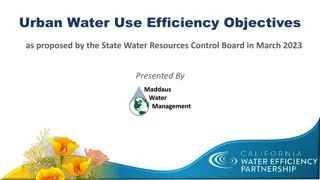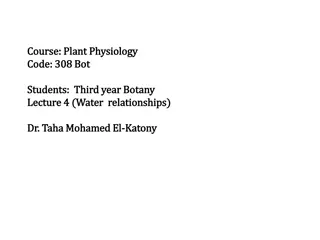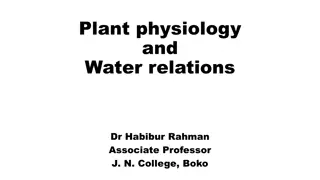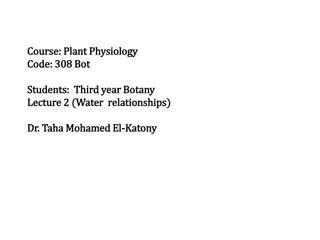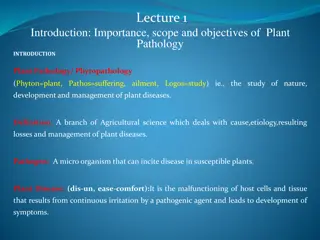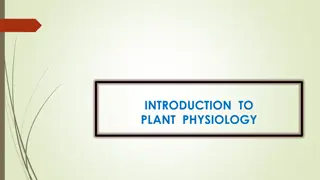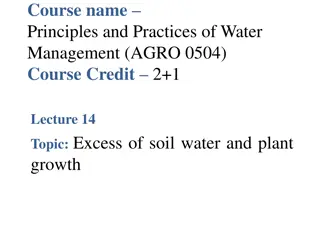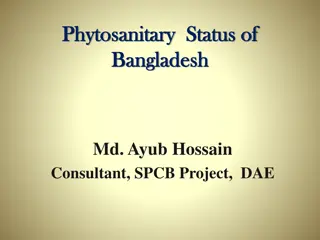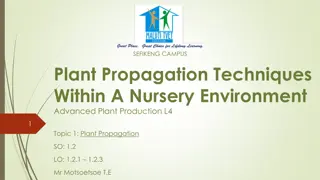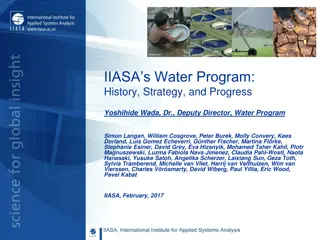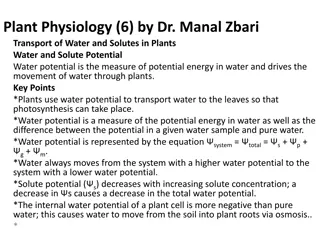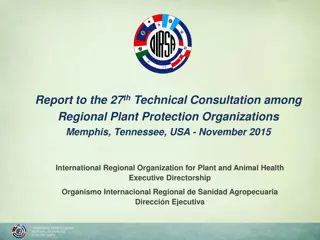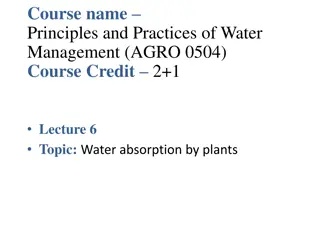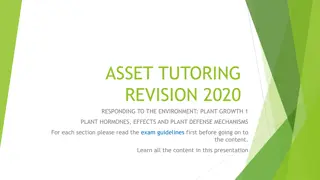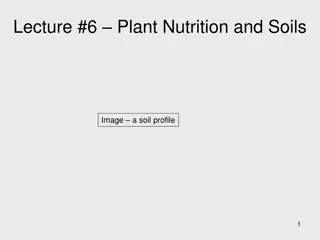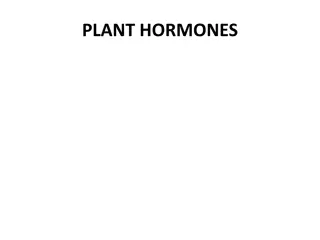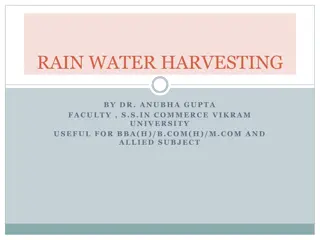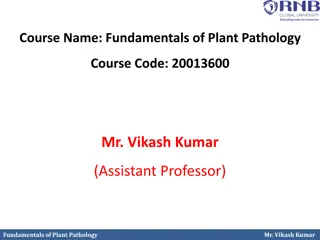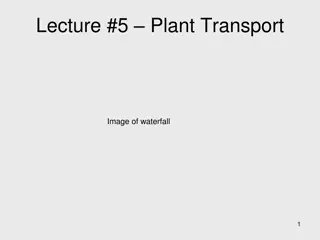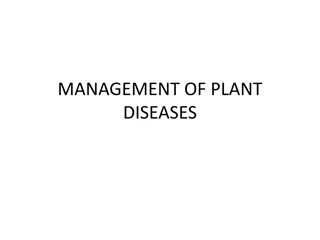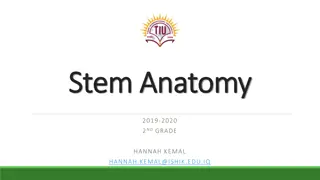Unit 1: Introduction and History of plant pathology
The science of plant pathology, which studies plant diseases and aims to protect the food supply by improving plant survival in unfavorable conditions. Explore the causes of plant diseases, their symptoms, and methods of prevention and control.
5 views • 13 slides
Alkaline Water Ionizer Machine In India | Best Alkaline water Machine
\n \nAre you fed up with consuming bland tap water that fails to deliver the health benefits you crave? Ionia presents a solution to revolutionize your water-drinking experience with our alkaline water ionizer machine. Our cutting-edge device converts regular tap water into premium-quality, antioxid
4 views • 5 slides
Water Ionizer India | Best Water Ionizer Machine
Water Ionizer India\n\nAre you worried about the purity of your drinking water? Look no further than Ionia, the premier provider of water ionizers in India. Our state-of-the-art technology converts ordinary tap water into pristine, alkaline, and antioxidant-rich water, ensuring optimal health and vi
2 views • 5 slides
Understanding Principles and Practices of Water Management in Agriculture
This course delves into the field water cycle, water movement in soil and plants, soil-plant-water relationships, water dynamics in the soil-plant-atmosphere system, soil composition, soil texture classification, permeability factors, density of soil solids, total porosity assessment, and energy asp
8 views • 62 slides
Understanding Water Management: Principles, Practices, and Soil-Water Relations
Explore the principles and practices of water management in agriculture with a focus on water availability, nutrient relationships, and losses. Discover the physical classification of water, available water defined between field capacity and wilting point, soil water potential, and the soil-plant-at
6 views • 17 slides
Water Filtration & Bottles Stay Refreshed Anywhere, Water Filtration & Bottles
Stay Refreshed Anywhere, Water Filtration & Bottles\nSurvival Supplies Australia understands the importance of staying hydrated outdoors. When you're on the move, having a clean and fresh supply of drinking water is essential. Our range, including water filter bottles and portable water filters, ens
3 views • 1 slides
State Water Resources Control Board's Urban Water Use Efficiency Objectives
The State Water Resources Control Board proposed Urban Water Use Efficiency Objectives in March 2023 to address the challenges of a hotter, drier future. The objectives include creating storage space for up to 4 million acre-feet of water, recycling and reusing at least 800,000 acre-feet of water pe
0 views • 32 slides
Understanding Water Relationships in Plant Physiology
Water plays a crucial role in the physiology of plants, with most absorbed water being translocated to leaves and lost through transpiration and guttation. While essential for turgidity and mineral translocation, plant water use is often inefficient. Transpiration is the primary mode of water loss,
3 views • 22 slides
Understanding Plant Tissue Culture Media and Their Importance in In Vitro Growth
Plant tissue culture media play a crucial role in the in vitro growth and morphogenesis of plant tissues. The composition of culture media depends on the specific plant species and the type of material used for culture. Various types of media, such as White's medium, MS medium, B5 medium, N6 medium,
0 views • 6 slides
Understanding Plant Physiology and Water Relations
Plant physiology, specifically water relations, is crucial for the survival and growth of plants. This study delves into the mechanisms of water absorption, cell components like vacuoles and protoplasm, and the concept of water potential. Water plays a vital role in plant functions, from providing m
2 views • 32 slides
Understanding Water Absorption in Plant Root Systems
Absorption of water by plant roots is a crucial process involving osmosis and gradients. The root system structure plays a vital role in water absorption efficiency, with root hairs being key to this process. Factors such as soil penetration depth and root hair characteristics impact the extent of w
0 views • 21 slides
Understanding Water Potential and Osmosis in Plants
This content delves into the concept of water potential, osmosis, and pressure potential in plant biology. It explains how water moves within plant cells, the unit of measurement for water potential, the role of osmotic potential in water movement, and the effects of solute concentration on water po
3 views • 18 slides
Understanding Plant Pathology: Importance, Scope, and Objectives
Plant pathology, also known as phytopathology, is the study of plant diseases and their management. It covers the causes, symptoms, and impact of pathogenic organisms on plants. The field aims to understand the interactions between plants and pathogens, develop control methods, and reduce losses in
0 views • 6 slides
Introduction to Plant Physiology: Exploring the Functioning of Plants
Plant physiology is a crucial subdiscipline of botany that delves into the processes and functions operating within plants. This field closely examines areas like plant morphology, ecology, cell biology, and genetics, shedding light on vital processes such as photosynthesis, respiration, and more. T
1 views • 7 slides
The Global Water Crisis and Transboundary Issues in Southern Africa
The global water crisis is a pressing issue affecting millions worldwide, with about 700 million people currently living below the water-stress threshold. By 2025, this number is projected to reach 3 billion. The increasing pressure on shared water resources in countries like Botswana, Namibia, and
0 views • 52 slides
Understanding Plant Tissue Culture: Techniques and Applications
Plant tissue culture involves maintaining and growing plant cells, tissues, or organs in artificial mediums under controlled conditions. It allows the regeneration of whole plants from small plant parts or cells. Hormones like auxins, cytokinins, and gibberellins are used in the process. Proper envi
3 views • 5 slides
Understanding Excess Soil Water and Plant Growth in Water Management
Excess soil water can lead to waterlogging, affecting plant growth negatively by creating anaerobic conditions, promoting growth of water-loving plants, hindering tillage operations, accumulating harmful salts, lowering soil temperature, and reducing crop maturity time. Preventive measures include c
0 views • 8 slides
Plant Tissue Culture Methods for Growth and Reproduction Study
Plant tissue culture methods such as root tip culture, shoot-tip culture, leaf culture, flower culture, and anther and pollen culture allow for the study of growth, reproduction, and genetic variations in plants. These techniques involve culturing various plant parts under sterile conditions to inve
1 views • 20 slides
Understanding Plant Quarantine and Phytosanitary Measures
Plant quarantine involves efforts to prevent the entry, establishment, or spread of foreign pests through legal restrictions on plant and plant product movement. It is crucial for safeguarding plant health, food production, and ecosystems. Phytosanitary measures aim to ensure the health of plants by
0 views • 33 slides
Understanding Mineral Nutrition in Plants
Mineral nutrition in plants involves the acquisition of essential elements in the form of inorganic ions from soil, followed by their absorption and utilization in various plant processes. Around 60 different elements have been reported in plants, with 30 being essential for plant growth. These esse
0 views • 39 slides
Plant Propagation Techniques in Nursery Environment
Learn about plant propagation techniques within a nursery environment, including nursery operations, potting seedlings, plant protection, weed control, packing of nursery plants, and crafting tissues for plant growth. Explore the essential tasks involved in nurturing seedlings and trees before they
0 views • 17 slides
Water Storage Tanks Hydraulic Modeling and Water Quality Considerations
This presentation by Justine Carroll, P.E., Project Manager, focuses on the hydraulic modeling and water quality considerations related to water storage tanks. It covers topics such as water age evaluation, steady state modeling, extended period simulations, pump controls, demand patterns, EPS verif
0 views • 34 slides
IIASA's Water Program: History, Strategy, and Progress
IIASA's Water Program focuses on addressing water insecurity, uncertain futures, food security, degraded water environments, and the impacts of floods and droughts. Their mission involves conducting interdisciplinary research to identify sustainable water solutions for improving human well-being thr
0 views • 10 slides
Improving Water Quality and Supply Efficiency for Yorkshire Water Customers
Yorkshire Water aims to enhance water quality and reduce interruptions in supply for its customers. By investing in maintenance and modernization of water mains, they seek to address issues related to the look, taste, and smell of tap water, as well as minimize unplanned interruptions to the water s
0 views • 30 slides
Understanding Water Potential in Plant Physiology
Water potential is a crucial concept in plant physiology, driving the movement of water within plants. It is a measure of potential energy in water and influences processes like photosynthesis. This potential is influenced by factors such as solute concentration, pressure, gravity, and matrix effect
0 views • 25 slides
Plant Health Initiatives at the 27th Technical Consultation Among Regional Plant Protection Organizations - Memphis, Tennessee
The 27th Technical Consultation in Memphis, Tennessee focused on plant health initiatives by the International Regional Organization for Plant and Animal Health. OIRSA emphasized four key technical areas: plant health, animal health, agricultural quarantine, and food safety. Projects included addres
0 views • 13 slides
Water Absorption by Plants: Mechanisms and Adaptation Strategies
Understanding water absorption by plants is crucial for effective water management in agriculture. Plants absorb water through active and passive methods, driven by osmotic and non-osmotic processes. Root hairs play a significant role in facilitating water uptake, with mechanisms such as osmotic act
0 views • 26 slides
Plant Growth Hormones and Defense Mechanisms: Understanding Plant Responses to the Environment
Plant growth hormones and defense mechanisms play crucial roles in how plants respond to environmental stimuli such as water, sunlight, gravity, and more. From auxins promoting cell growth to gibberellins stimulating flowering, this presentation educates on the intricacies of plant hormones and thei
1 views • 13 slides
Plant Nutrition and Soils: Essential Elements and Resource Requirements
Explore the essential elements required for plant growth, how plants acquire resources, the role of soils in providing nutrients, and the composition of plant tissues. Key concepts include resource acquisition methods, soil factors, and the importance of water in plant tissue. Critical thinking ques
0 views • 140 slides
Understanding Plant Hormones and Their Role in Growth and Development
Plant hormones are vital compounds that regulate various processes in plant growth and development. They are mostly organic and can be gases. These hormones are produced in one part of the plant and transported to other parts where they induce physiological effects. The main phytohormones include Au
0 views • 125 slides
Importance of Rain Water Harvesting and Its Benefits
Rain water harvesting is a crucial method for managing and conserving water resources. Dr. Anubha Gupta, a faculty member at Vikram University, explains the significance of harvesting rain water for human, animal, and plant needs. The process involves collecting and storing rain water from various s
0 views • 10 slides
Fascinating Facts About Water and Its Importance
Water is an essential resource, with only a small percentage being fresh and usable. The water cycle, water usage statistics, and the significance of water for people, plants, and animals are highlighted. The content covers details on global water distribution, water scarcity in Australia, and daily
1 views • 9 slides
Fascinating Facts About Water and Its Properties
Explore interesting facts about water, including its crucial role for life on Earth, the distribution of water on our planet, and the properties of the water molecule. Learn about the importance of water for human health, the chemical reactions that form water, and the different states of water. Dis
0 views • 26 slides
Water Infrastructure Financing in Utah: Overview of Revolving Loan Funds
Utah's water infrastructure financing system is managed through revolving loan funds established by the Board of Water Resources. These funds date back to 1947 and have been consistently funded from various sources to support projects related to water supply, flood control, and dam safety. The progr
0 views • 12 slides
Simplified Landscape Irrigation Demand Estimation: SLIDE Rules for Water Budgets
Simplified Landscape Irrigation Demand Estimation presents a comprehensive guide on managing urban landscape water use efficiently. Collaborators from various institutions contribute to addressing the challenges posed by drought and climate change. The document explores plant water demand, atmospher
0 views • 29 slides
Water Quality - Measuring Turbidity of Different Water Sources
The activity involves comparing the turbidity of various natural and artificial water sources using a Labidsc turbidity sensor. Monitoring water quality is crucial for identifying pollutants, trends, and usage patterns in water resources. Factors like human activities affecting water quality through
0 views • 18 slides
Exploring the Fundamentals of Plant Pathology: Understanding Viruses in Plant Diseases
Delve into the world of plant pathology with Mr. Vikash Kumar, as you learn about the nature, structure, and transmission of viruses affecting plants. Explore the important characteristics of plant viruses, their unique properties, and how they interact within plant cells. Gain insights into viral d
0 views • 14 slides
Understanding Plant Water Transport Mechanisms
Explore the intricate process of water movement in plants through essential concepts such as water potential, transpiration, and the pressure flow model. Discover why water is crucial for plant metabolism, nutrient uptake, and gas exchange, as illustrated in captivating diagrams. Learn how water pot
0 views • 134 slides
Overview of Plant Quarantine and Disease Management
Plant quarantine is a crucial practice that involves regulating the movement of plants and plant products to prevent the spread of pests and diseases. Originating with the first law in France in 1860, plant quarantine now encompasses various methods such as embargoes and inspections to safeguard pla
0 views • 11 slides
Understanding the Anatomy and Functions of Plant Stems
Plant stems play a crucial role in the growth and survival of plants. They transport water, minerals, and sugars, support leaves and flowers, and store food. The outer structures of stems, such as buds and nodes, are essential for plant growth. Furthermore, the tissues inside the stem, including xyl
0 views • 12 slides






